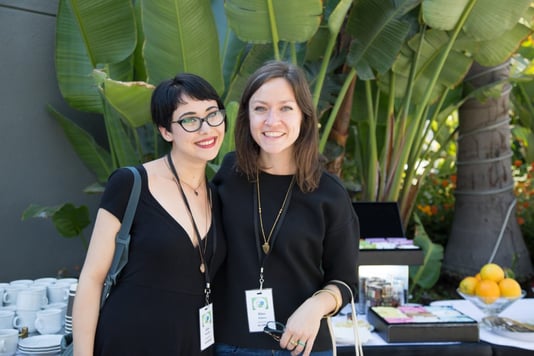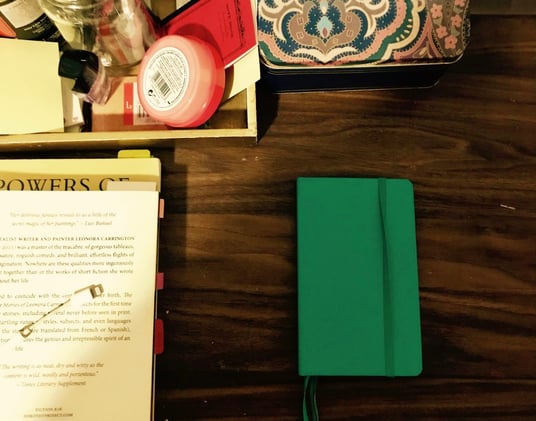I met writer and Point alumni Ellen Adams in the last few hours of the Point Arts and Humanities LEAD this past October. The conference-- three days of panels, discussions, and trips to arts and culture landmarks in LA-- was packed with scholars, alumni, and professionals doing everything from screenwriting to cultural anthropology. By the last day, I was inspired, motivated, emotional, and ready to sleep for a week. Somehow, Ellen and I hadn't managed to cross paths yet.
The last event of the conference was a panel about forging career paths "outside the box." On the panel, Ellen talked about her writing, balancing it with the rest of her life, and how she is making a life out of that process. As a young queer writer in the beginning stages of figuring out that balance for myself, I had a million questions I wanted to ask her. So immediately after the panel, I tracked her down. We began a conversation that we are now continuing via phone calls, a conversation that has spanned far beyond writing. Through talking to Ellen, I have come to understand so much about creating art, caring for myself, and caring for others. Here are some pieces of guidance that are especially near and dear to me.

NBCUniversal Point Scholar Julia Horwitz with Point Alum Ellen Adams and the Point Arts & Humanities LEAD
- Take Your Time
At the beginning of this semester, some mental health issues were coming up in my life and forcing me to slow down, focus on caring for myself, and take a closer look at where my time and energy was going. In the process of doing this and seeing positive results, I struggled with feeling like I wasn't doing enough, and that I was going to have to pay for it later.
A few days after expressing these fears to Ellen, she sent me this in an email: "no matter how many courses you do or don't take in a semester, no many how many semesters unfold as you take them, your intelligence, talent, strength and potential do not change, and they definitely don't diminish. They are still just as powerful, if not more so, and they are already a core part of you, independent of any other timeline."
I wrote this in the inner flap of my planner so that each time I find myself frustrated with how much I wish I could do vs. how much I'm doing, I remember to be gentler with myself.

- Wide Open Sky
Ellen has given me some of the most helpful concrete writing advice that I've ever gotten. We've talked about the realities of finding jobs that leave both time and money to focus on writing, what to include in a cover letter, and how to hold yourself to a writing schedule that is both productive and sustainable. But one of the most helpful things she's shared is her own strategy for getting rejected, which, as we have talked about again and again, is the necessary evil of trying to get your writing out into the world.
She keeps track of all of her submissions in a spreadsheet and if a piece gets rejected, she fills that column in blue like a "wide-open sky." Inspired by her, I created a color-coded spreadsheet of my own with my favorite shade of yellow reserved specifically for let-downs.
I have found myself thinking about this strategy in so many other contexts-- learning to take rejection, a reality of trying anything new, as the start of something better. Or, until it really feels that way, decorating my rejection instead of letting it loom over me.

- Little Green Book
On my desk, there is a little green notebook that Ellen sent me a few months back. Her instructions were simple: when you do something to help yourself move forwards as a writer, jot it down in the book. Then, if you feel like you're not doing enough, you can flip through and prove yourself wrong.
I have found myself doing exactly this regularly, reminding myself of what I'm capable of and celebrating small victories. This could be meeting with a professor I'm intimidated by, turning down a club leadership role that I don't actually have time for, or exchanging drafts with a friend I trust. The green book has made me think a lot about mentorship and why Ellen's friendship serves such an important role in my life. Having someone I admire and see myself in as much as her to talk to is one important layer-- a sense of connection that Point does so much to cultivate. But it's a give and take-- she gives me the green book, I fill it. And I hope, somewhere down the road, I can take a page from Ellen's book and give a little green book to someone else!
To Ellen, thank you so much for your mentorship and friendship! And to whoever is reading this, maybe these reminders will be as comforting to you as they have been for me.

This post was written by NBCUniversal Point Scholar Julia Horwitz.
Julia is studying English at Brown University. As a queer woman, Julia feels that it is her responsibility to tell her story as honestly and often as possible, since LGBTQ representation in the media is minimal and often inaccurate. She is also a visual artist and illustrated the therapeutic children's book, The Elephant in the Room: a Children's Book for Grief and Loss. Read more about Julia here.

